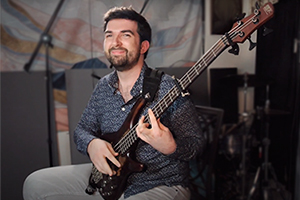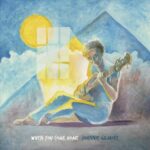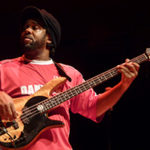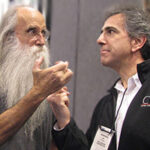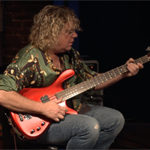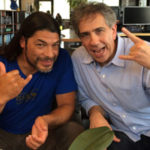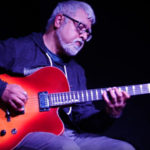Versatile L.A. bassist tells how he navigates the tightrope between solo bass playing and ensemble work
Exclusive interview with FBPO’s Jon Liebman
May 24, 2021
Johnnie Gilmore isn’t afraid of wearing different musical hats. On the one hand, the Boston native has undeniably made a splash as a solo bassist. As a solo artist, he has opened up for Stu Hamm and Fareed Haque and shared billings with the likes of James Taylor, Carole King, Trey Songz, Blake Mills and Roy Choi. But he also enjoys the traditional bass role. A graduate of Wesleyan University’s music program, he has years of experience performing with jam bands and jazz ensembles. He continues to work as a sideman, collaborating with groups like The Wailers and Fantastic Negrito. As a leader, he’s released two albums, the most recent being last year’s When You Come Home.
FBPO: How did you become a bass player?
JG: In hindsight, I kind of see it as I always was a bass player. I started with piano lessons in second grade. I still play piano and I still love it. But when I was in middle school, I was an angsty teenage boy. I started listening to a lot of hair metal and heavy rock, that kind of thing. It doesn’t sound the same on the piano, and it’s not quite as expressive as a guitar, so I wanted to play guitar. I liked the guitar and I even had one for a few weeks, but there was this kind of weird thing. I’m kind of a big dude and I have big fingers and I was trying to do some of those chord voicings, like A and F where you have to jam a bunch of fingers into one fret and it all felt really tiny. There was a certain richness of tone that I could hear other guitar players do, but it just never sounded like that when I played it. Playing guitar also exposed me to the existence of the bass as a separate instrument.
FBPO: It’s kind of like a guitar, and kind of not.
JG: Exactly. I used to hear it on records and just think, “Well, that guitar sounds kind of funny.” I didn’t realize it was its own thing. At first I didn’t understand why people would play the bass, because it has fewer strings. And you’d stand in the back with the drummer and you don’t get to take solos. And I was kind of like, “Why is that a thing people do?” So I tried it. I have this incredibly vivid memory of sitting at a Guitar Center with a little Squier, P bass, just pulled something off the wall and plugged into this little amp and played the only bassline I knew from middle school jazz combo, which was “So What” by Miles Davis. And the sound just exploded out of that amp at me! And I couldn’t believe the sound I wanted from the guitar all this time, that was it, that was the tone.
FBPO: I was expecting you to say, “Iron Man” or “Seven Nation Army” or something like that. I was not ready to hear you say “So What!”
JG: I know that’s a weird choice, but I mean, I knew a lot of guitar riffs at that point, but the only dedicated bassline I could think of was that one.
FBPO: Who were your bass influences once you discovered the instrument?
JG: The first big one was John Paul Jones. Still love John Paul Jones. But the first guy that really turned my world upside down was James Jamerson. And when I was taking bass lessons in freshman year of high school, my teacher showed me “Bernadette” and “I Was Made to Love Her” and “For Once in My Life,” and it just blew my mind. And I was singularly obsessed with Jamerson for like two years after that. I got the Dr. Licks book and learned all the transcriptions. And I would like play along with the records and I had.
FBPO: All the transcriptions in that book?
JG: Every note, I learned them all.
FBPO: What did you set out to do initially on the bass? What you ended up doing is pretty far from removed from traditional bass playing.
JG: It’s pretty crazy, right? All I knew is that it was right. I just knew that what I was supposed to do was play the bass. I had always figured I would play in bands, and I do still play in bands. I still love to be a sideman and get my Lee Sklar on and just play a bunch of whole notes and half notes and glisses. But when I was about a sophomore or junior in high school, my next big phase, as far as influences go, was Victor (Wooten). Jaco and Victor I discovered after a few years, and it didn’t take long to realize that that’s a style of playing that doesn’t have a lot of use as far as being a sideman playing in bands goes, but I just loved the sound of it. I love the sound of one person playing all the parts at once. And I just thought it would be a fun challenge.
FBPO: How did you get started with it?
JG: I just started goofing around with it in my spare time, just to see if I could. And I also started to figure once I started getting into it, just playing solo, that if I could perform and do everything by myself on the bass, then it should banish my stage demons playing in a band, because once you have a band you can lean on, I figured it would be a piece of cake, even if I never actually regularly performed solo bass. If I could just survive a gig or survive a set of open mic night, I figured it would do wonders for my stage demons. And it did actually. It boosted my confidence a lot.
FBPO: How did you develop your solo style?
JG: Chet Atkins had a phrase for when young musicians would steal little licks and tricks from the old guard. He calls it, “petty theft.” And so, it was really just a lot of petty theft. I stole a lot of stuff from Victor. I stole a lot of stuff from Jaco. I stole a lot of stuff. My style started rounding into form as a more unique thing when I started stealing from guitar players like Chet, like Tommy Emmanuel. And Lenny Breau is an extraordinary guitar player. And I loved that harmonics technique that Chet stole from him and then Tommy stole it from Chet. And just the way that sound has evolved is so inspiring to me.
FBPO: You primarily play a four-string?
JG: Four-string tenor bass for the solo stuff.
FBPO: How are your basses tuned?
JG: Just standard fourths. And I have a de-tuner on the low string, so I can do drop D. There’s a moment on the EP, When You Come Home, that I’m really proud of, which is at the end of “When You Wish Upon a Star.” There’s a couple of key changes in that arrangement, but at the very end of it, I do the melody and harmonics in D after most of the arrangement was in E. And then, I tap, like at the end of Victor Wooten’s “Amazing Grace” when he taps the fist and slides it down to the low tonic and then he tunes the string up. So I did that, but I tap the fifth and then slide it down and I de-tune the string as I slide it, so I get the low D at the end, even though it’s standard tuning before that. It’s a nice middle ground. You still got the booty, but it sounds a little bit sort of more expressive. It sounds a little bit more sort of vocal, especially in the higher register and I just liked it.
FBPO: What’s the balance between your playing as a solo artist versus in the traditional role of a bassist with a band?
JG: It fluctuates. Being a freelance guy in LA for the last few years, I’ve learned that it seems like, week-to-week, the slate of work is totally different. I have weeks where it’s predominantly sideman, or if I’m touring with a band, then it’s exclusively sideman for however long we’re on the road. And then sometimes it’s all solo for a week or a couple of weeks. I’ve toured as a solo act before where every day for a month was solo. But they’re both very important to me. I always want to have both. And I guess, I would probably try to keep the balance as close to 50-50 as can be done with the logistics.
FBPO: When you were playing with a band, do you ever get the urge to step out and do the kinds of things that’ll get you fired from a gig?
JG: [Laughs] I would say that I have looked at it that way before. The older I get and the more experienced I get, the more I feel like it isn’t about playing more notes. Playing more notes does not mean you’re having more fun. Though sometimes it does.
FBPO: Depends on the notes.
JG: It absolutely does, but I think that the more experience I get and the more secure I feel in my technique and where I am as a player, the less I feel like being flashy.
FBPO: What’s been keeping you busy these days?
JG: Originally, for last year, my plan was to tour in April and May. I actually had the whole thing booked. Then the virus came and suddenly I was trapped at home with nothing to do. So I figured I’d make the record earlier. It ended up being a great sort of catharsis with all this energy and all this uncertainty in the world. I realized a lot of musicians were stepping up, trying to fill the voids that had been left in all of our lives. It turned out to be the most serendipitous timing for artists to say, “We can still have community, even if we can’t see each other in person.” I hope the music helps people get through the struggles and the troubles they’re having with the pandemic and everything else that happened in 2020, or to escape from it for a little while because that’s important too. Every song on that record is about a person or a place or a thing that I missed in quarantine, which was kind of a nice coincidence.
FBPO: Tell me about your gear.
JG: There’s not a lot to tell, although there used to be. When I was in high school, I had a lot of pedals and stuff, but my preference for pretty much any gig, anywhere solo with a band, is just to plug right into the PA. I think it sounds cleaner, I think it sounds better, I think it’s easier for everybody. I do have a TC Electronic BG-250, which is a 210. And I use that if I have to bring an amp to a gig. The basses are Ibanez Soundgear and that’s pretty much it for gear. I don’t have a whole lot of crazy stuff.
FBPO: What kind of strings?
JG: Elixir.
FBPO: What advice do you have for someone who wants to learn bass?
JG: Have fun. Have fun and learn something new every day. Billy Sheehan actually has a great answer to this question. He said, he told the story that somebody sent him an email and said, “I’ve been playing bass for a few months and I’m bored. Help.” And Billy said, “Quit. It’s not for you. I’ve been doing this for 50 years and I’m still learning something new every day.” So, if you’re enjoying it, if you’re having fun, if you’re learning something every day, then just stick with it. It’s not going to lead you down any bad paths in your life.
FBPO: You made some good points about knowing that when you’re playing solo, you’ve got to put that hat on, and when you’re supporting the band, you’ve got to put that hat on. That’s a very important distinction that, frankly, not everybody gets.
JG: Well, it took me a minute too, and I’m still working on it like everything else, but yeah, I enjoy it. I enjoy going back and forth.
FBPO: What would you be if you weren’t a bass player?
JG: I have no goddam idea. [Laughs] I hope I never have to answer that question!
See Jon’s blog, with key takeaways from this interview here.
Johnnie’s latest release, When You Come Home, is available here:
